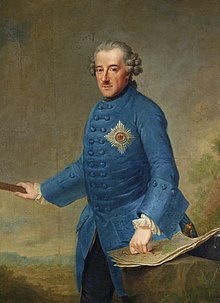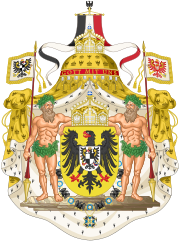 Global Information
Global InformationFrederick the Great information
| Frederick the Great | |||||
|---|---|---|---|---|---|
 Portrait by Johann Georg Ziesenis (1763) | |||||
| |||||
| Reign | 31 May 1740 – 17 August 1786 | ||||
| Predecessor | Frederick William I | ||||
| Successor | Frederick William II | ||||
| Born | 24 January 1712 Berlin, Kingdom of Prussia | ||||
| Died | 17 August 1786 (aged 74) Potsdam, Kingdom of Prussia | ||||
| Burial | Sanssouci, Potsdam | ||||
| Spouse |
Elisabeth Christine of Brunswick-Wolfenbüttel-Bevern
(m. 1733) | ||||
| |||||
| House | Hohenzollern | ||||
| Father | Frederick William I of Prussia | ||||
| Mother | Sophia Dorothea of Hanover | ||||
| Signature |  | ||||
| Military career | |||||
| Service/ | |||||
| Battles/wars | Tree-like list
| ||||
| Prussian Royalty |
| House of Hohenzollern |
|---|
 |
| Frederick William I |
|
| Frederick II |
Frederick II (German: Friedrich II.; 24 January 1712 – 17 August 1786) was the monarch of Prussia from 1740 until 1786. He was the last Hohenzollern monarch titled King in Prussia, declaring himself King of Prussia after annexing Royal Prussia from the Polish–Lithuanian Commonwealth in 1772. His most significant accomplishments include his military successes in the Silesian wars, his reorganisation of the Prussian Army, the First Partition of Poland, and his patronage of the arts and the Enlightenment. Prussia greatly increased its territories and became a major military power in Europe under his rule. He became known as Frederick the Great (German: Friedrich der Große) and was nicknamed "Old Fritz" (German: der Alte Fritz).
In his youth, Frederick was more interested in music and philosophy than in the art of war, which led to clashes with his authoritarian father, Frederick William I of Prussia. However, upon ascending to the Prussian throne, he attacked and annexed the rich Austrian province of Silesia in 1742, winning military acclaim for himself and Prussia. He became an influential military theorist, whose analyses emerged from his extensive personal battlefield experience and covered issues of strategy, tactics, mobility and logistics.
Frederick was a supporter of enlightened absolutism, stating that the ruler should be the first servant of the state. He modernised the Prussian bureaucracy and civil service, and pursued religious policies throughout his realm that ranged from tolerance to segregation. He reformed the judicial system and made it possible for men of lower status to become judges and senior bureaucrats. Frederick also encouraged immigrants of various nationalities and faiths to come to Prussia, although he enacted oppressive measures against Catholics in Silesia and Polish Prussia. He supported the arts and philosophers he favoured, and allowed freedom of the press and literature. Frederick was almost certainly homosexual, and his sexuality has been the subject of much study. Because he died childless, he was succeeded by his nephew, Frederick William II. He is buried at his favourite residence, Sanssouci in Potsdam.
Nearly all 19th-century German historians made Frederick into a romantic model of a glorified warrior, praising his leadership, administrative efficiency, devotion to duty and success in building Prussia into a great power in Europe. Frederick remained an admired historical figure through Germany's defeat in World War I, and the Nazis glorified him as a great German leader prefiguring Adolf Hitler, who personally idolised him. His reputation became less favourable in Germany after World War II, partly due to his status as a Nazi symbol. Historians in the 21st century tend to view Frederick as an outstanding military leader and capable monarch, whose commitment to enlightenment culture and administrative reform built the foundation that allowed the Kingdom of Prussia to contest the Austrian Habsburgs for leadership among the German states.